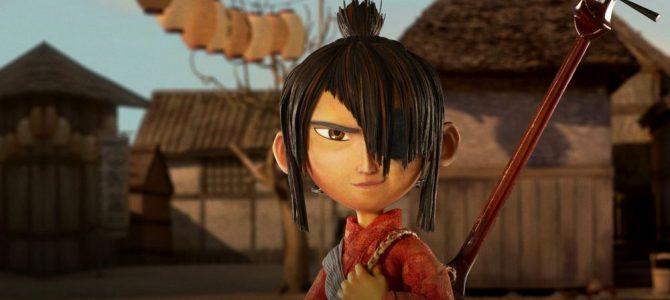
“Kubo and the Two Strings” was the remarkable animation of 2016, and it has received two Oscar nominations, giving everyone another a chance to see it and talk about it.
The story is this: the boy Kubo lives with his ill mother outside a village. He tells musical stories about his dead father to villagers, who are very impressed. This leads to a mythical fight against spirits from the moon, who attempt to kill him but are also his family. His music brings living and dead together in a way that creates strife. This threatens to destroy his village, so Kubo must undertake a spiritual journey, risking his sanity to learn how to live like a human being and poet.
The boy Kubo is grieving—not in psychological stages, but in song, threnody. He is a fatherless poet. He wants to tell the story of his dead father’s war against the Moon King, but the sun sets before he can do it. The father can never win. Fighting the Moon King by day would be fake. Kubo will have to do his own fighting and in the proper realm of soul, night, which is private and secret.
Kubo’s musical art prepares the movie’s plot. He plays a three-string instrument that animates his paper figures, which animate the audience. Soul comes out of song, and Kubo’s audience sees with their eyes what we have to see with our minds when reading stories. The most beautiful suggestion of his musical powers is that the depth of the paper figures is all superficiality. This kind of musical drama reproduces our own experience: we always start from appearances.
By night, Kubo again tries to join with the village and fails. He wants to pay homage to his dead father’s spirit. He performs his ritual, but nothing happens. He hoped to command a spirit to appear when needed. Feeling rejected by his father, Kubo unleashes a family drama of cosmic proportions.
Two Different Ways of Seeing
The dead belong to the moon. By night, we cannot see the world properly and therefore cannot act as by day. But our memory and imagination are still alert. Moonlight allows us to fantasize: we concern ourselves with what’s inside us and we reshape the outside world accordingly. Hence the boy losing an eye to his evil grandfather, the Moon King. He belongs in two different worlds and has two different ways of seeing.
Night becomes the element in which our story takes place. Kubo lives in a fantasy that might trap him: the plot. But this also matters to his audience. Practically, he plies his art to make ends meet in the village, with its life of crafts that protect and nourish the body.
Kubo and his mother, however, live in a cave by the sea. They are half-wild. His art threatens the village with destruction through grief. The music by which he moves their souls brings a pained awareness of our mortality. He has to learn about grief before settling in the village.
How did Kubo end up trapped in his fantasies about his heroic father that he can never complete without learning about death? He thinks stories fulfill desires. Story is a fake completion to life that truly reveals what life needs to be complete. His musical story fulfills his desire to have his father returned by articulating it with beauty. But the endlessly fantasized memory of his dead father might lead the boy to join him in death. Kubo misunderstands his music because he does not know about regret and guilt.
A Mother’s Love that Also Hurts
Kubo’s mother authored this crisis. Children do not know truth and lies. In their innocent belief is the seed of fatalism if events disappoint hopes. His father’s heroic story cannot explain his disappearance: the song always reawakens the boy’s love, the story always promises his father wins, but at the end of each day, the boy is alone.
Love’s offspring, the story, cannot satisfy. In offering something to answer his heart’s desires, the mother has trapped him in his father’s glory. He must enter the realm of shadows—poetry and the dead together, the world and his family in a myth—to free himself from the consequences of his mother’s helpless love.
Kubo learns from his parents. His mother gives him the power of song. His father gives him the idea of the beautiful: a noble warrior. Yet the boy does not know what makes a father perfect—the decision to protect his own. This idealization tacitly severs the connection between them. Self-deceived, the boy conceives of man as perfect independent of fatherhood. The boy thus prepares to render his father unnecessary by becoming independent.
Kubo enacts this drama unwittingly, with his mother’s help, as he learns her scolding is part of her sacrificial love. Her vulnerability and anger correspond as realities to the fantasies of his idealized father. Kubo’s idealization forced his mother to feed him likely stories. He wanted to know his father, but could not brook disappointment. Glory answered his need, risking his sanity but keeping hope alive.
He had attempted to win the villagers over by making his inside like his outside. He believes his father was a man as good as his word: inside and outside corresponded. He believed, therefore, that words create the world, as dreams seem to do. Yet this unwittingly nearly trapped his village in a fantasy of guaranteed success and secret chaos.
Kubo returns to revere his ancestors with the rest of his village. He is now grateful, no longer ceaselessly making demands of everything alive and dead. Previously, he had been like his audience: so impatient with his secret desires that he began to fantasize impossible things that got in the way of living a human life.









